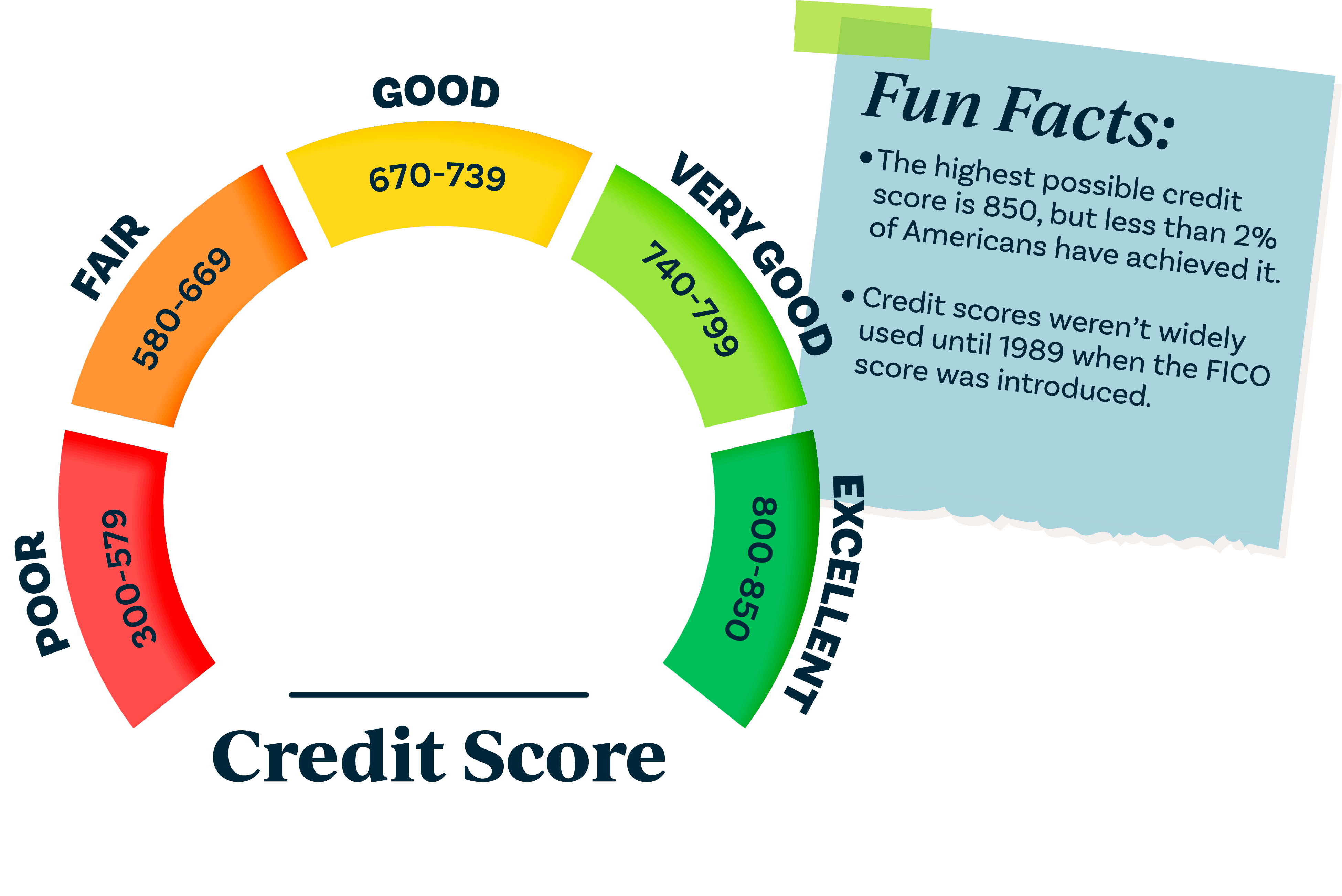Credit scores play a crucial role in our financial lives. Whether you're looking to buy a home, finance a car or simply apply for a credit card, your credit score can play a significant role in unlocking certain financial opportunities. This page covers everything you need to know about credit scores—from how they're calculated to tips on improving them.
What is a credit score?
A credit score is a three-digit number that represents your creditworthiness. Lenders use it to determine how likely you are to repay debt. Scores typically range from 300 up to a maximum of 850. The higher your score, the better your financial profile in the eyes of creditors. It's also possible to have a 0 as your credit score if you have no credit history yet.

Key Factors in Your Score
Your credit score is calculated based on five key factors:
- Payment History (35%)
This is the most important factor, showing whether you've made on-time payments for your current or even closed credit accounts. As a result, missing a payment can become a big deal. - Credit Utilization (30%)
The percentage of your available credit that you are using. Lower utilization usually means a higher score. As a general rule, aim for a credit utilization below 30%, though 10% or less is ideal.- Calculating credit utilization: Divide your total balance by your total credit limit and multiply by 100. Remember that if, for instance, you have more than one credit card, add them all together.
- Credit History Length (15%)
The longer your credit history, the more favorable it is to lenders. - Credit Mix (10%)
Having a mix of credit types (i.e. credit cards, mortgages, auto loans) can positively impact your score. - New Credit Inquiries (10%)
Frequent credit applications within a short time frame can negatively impact your score.

Pay Bills on Time
Payment history is the largest factor in your score. Set reminders or automate payments to ensure you're never late. Pay your credit card bills on time and in full.

Reduce Credit Card Balances
Keep your credit utilization below 30% of your available limit.

Don’t Close Old Accounts
Length of credit history matters. Even if you're not using an old card, sometimes keeping it open can help your score.

Limit New Credit Applications
Each time you apply for credit, a hard inquiry occurs, which can lower your score.
Credit Score Ranges
Credit scores can range from poor to excellent. Moving the needle takes time but in the end is worth the effort!


Credit Scores: Facts vs. Myths
Credit scores are often misunderstood, leading to myths that can affect your financial decisions. Some believe checking your credit score will lower it, while others think closing old accounts will help improve it. Let's debunk these common myths and set the record straight, so you can make informed decisions about your credit.
MYTH | FACT |
|---|---|
Checking my score will lower it. | Checking your score yourself from a legit source, like the credit bureaus themselves, won’t impact it. It's important to monitor your score since it helps you track progress when building credit as well as identify any errors. You're actually entitled to a free credit report every year. |
Carrying a balance on my credit card boosts my credit score. | Carrying a balance on your credit card doesn’t help your credit score - in fact, it has the potential to hurt it and it will end up becoming costly over time by paying interest. Plain and simple, it’s a waste of money to pay interest on your balance if you can afford to pay off your credit card bill in full each month. |
Credit score is proportional to income and wealth. | Credit scores are just an assessment of your risk to lenders, while income is merely a measurement of your capacity to pay bills. |
Getting married combines my credit score with my spouse. | Your credit report is unique to you alone. When it comes to applying for new credit with your partner, such as filling out a joint application for a mortgage, each person's score is taken into consideration. |
When paying with a debit card, selecting "credit" will raise my score. | Your debit card and credit card are two completely separate things, regardless of if you select "credit" or "debit" at the point-of-sale. It's important to remember that debit card transactions have no bearing on your credit and when you use a debit card for a purchase, the money will be withdrawn from your checking account regardless. |
Closing a credit card will raise my score. | Closing a card won't immediately raise your score. In fact, closing a card will most often lower your score at first since it will lower your overall credit utilization amount. That said, if the card encourages poor spending habits or has costly fees, closing it may be worth the short-term hit to your score. |
All debt is the same. | Yes and no. At its core, debt is debt. However, there are two main types of debt: Revolving and installment. Revolving debt refers to debt you’re able to access on a regular basis, repay and continue accessing. Installment debt involves receiving a lump sum of proceeds and repaying the debt with a fixed payment over a fixed time. Once paid off, the loan is closed. Having a mix of revolving and installment debts shows you’re able to handle both and may help your credit score, but never utilize credit if you don't actually need it. |
FAQs
MONEY TIPS

How to Negotiate a Lower Credit Card Rate
Negotiating a lower interest rate on your credit card can save you loads of money in the long run.

Tips to Raise Your Credit Score
Credit can be a great financial tool - when it’s utilized correctly.

5 Credit Card Mistakes to Avoid
Most of us know the basics about credit cards, but did you know there are some common practices that might be negatively impacting you? Learn five of the top credit card mistakes, and how to avoid making them.
Plan for Anything
Our 40+ free financial calculators can help you finesse your budget, compare borrowing costs, forecast earnings and so much more.
Harness the Power of Mobile Banking
OMB's industry-leading mobile banking app puts you in control of your finances in powerful new ways. Check balances, transfer funds, pay bills, deposit checks, even chat live with our friendly staff directly in the app. With enhanced digital banking features and online security, you'll wonder how you ever lived without it. Download it now!
Your 24/7 Personal Digital Branch
Payments are fast, safe and easy thanks to Zelle®. Pay your family and friends or request money regardless of where they bank.


Want to visit us in person? Find your nearest branch.

